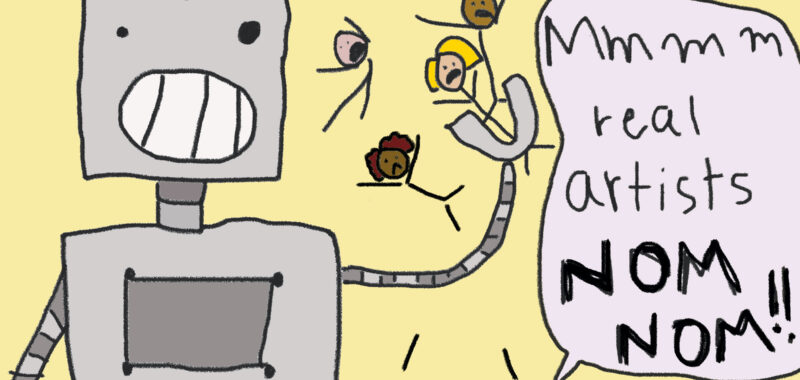A group of 10 visual artists can proceed with copyright claims against four companies using text-to-image generative AI, a California judge ruled Monday, August 12.
The artists filed a class-action lawsuit against Stability, Midjourney, DeviantArt, and Runway with the United States District Court in Northern California last November, alleging that the image generator Stable Diffusion uses their artwork as “training.” The original lawsuit also alleged that the generator, which the four companies each utilize, can mimic the artists’ styles, according to court documents. This week’s opinion comes after AI companies moved to dismiss artists’ claims.
“Plaintiffs’ central claims will now proceed to discovery and trial,” Matthew Butterick and Joseph Saveri, two of the lawyers representing the artists, wrote in a statement to Hyperallergic. The artists who brought the suit are Sarah Andersen, Kelly McKernan, Karla Ortiz, Hawke Southworth, Grzegorz Rutkowski, Gregory Manchess, Gerald Brom, Jingna Zhang, Julia Kaye, and Adam Ellis.
While District Judge William Orrick threw out the plaintiffs’ claims of unjust enrichment and breach of contract, he ruled that the artists’ copyright complaints were plausible, including the claims that their artwork was used to train the companies’ AI.
“You cannot copy someone’s work without their permission and you can’t then keep that copy because that is infringement,” Philippa Leongard, executive director of the Kernochan Center for Law, Media and the Arts at Columbia University, told Hyperallergic.
Lawyers representing Stability, Midjourney, DeviantArt, and Runway did not immediately respond to requests from Hyperallergic to comment on the case. In a May hearing, Andy Gass, a lawyer for DeviantArt, warned of the “havoc that would be wreaked” if the suit was allowed to move forward, adding that DeviantArt “didn’t develop any gen AI models … all [it’s] alleged to have done is take StabilityAI’s Stable Diffusion model, download it, upload it and offer a version” for its users.
For artists who say they have seen AI image generators replicate their work, like New York illustrator and AI critic Molly Crabapple, models trained on real artworks could completely destabilize their lives as working artists. In May 2023, Crabapple authored an open letter urging the publishing industry to avoid using AI in illustration.
“[These image generators] are built on the stolen work of artists for the purpose of enriching a few Silicon Valley corporations while they de-skill, disempower, and eventually replace labor,” Crabapple told Hyperallergic.
The artist shared the output of a prompt given to OpenAI to create an image in her style with Hyperallergic. The chatbot provided four options in her artistic style for each prompt she provided.
Earlier this year, a purported list of artists whose work is used to train Midjourney’s generator leaked to the public, including high-profile names such as David Hockney and Yayoi Kusama. But as image generators learn to mimic the artistic styles of illustrators, Crabapple said, working-class artists will be the most affected.
“These aren’t people who made tons of money,” Crabapple said. “These are people in their later middle age in America who are facing retirement with nothing because these Silicon Valley companies decided they needed to make billions and billions of dollars.”
The class-action suit centers on the companies’ alleged use of the so-called LAION dataset, a collection of five billion images, to develop the image generator Stable Diffusion.
According to Leongard, when artists disseminate their work online, it could get “scraped” by AI companies.
“There’s all sorts of layers of infringement here,” Leongard said. “AI only works when it has data, and AI can’t generate its data. It needs to have new material in order for the platform to do what it does.”
While the lawyers representing the artists celebrated the ruling as a “significant” next step in the case, Leongard added that it is too soon to tell whether this case and other similar copyright cases will protect creative people in the age of AI.

